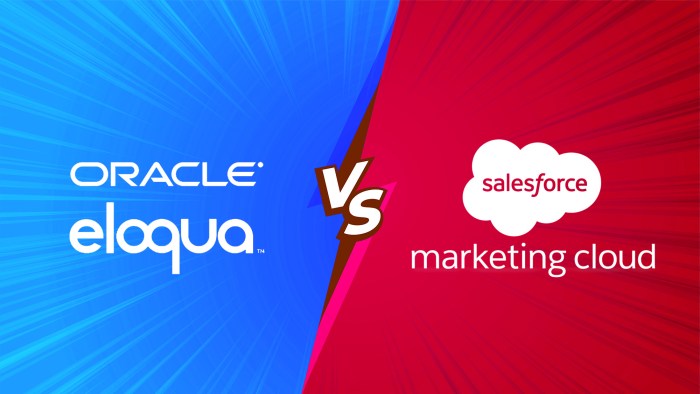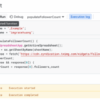Comparing Eloqua and Marketo: A deep dive into these marketing automation powerhouses reveals crucial insights for businesses seeking the perfect fit. This exploration delves into their functionalities, pricing, target audiences, integrations, support, scalability, security, and more. Understanding the nuances between these two platforms is key to making an informed decision for your marketing strategy.
Both Eloqua and Marketo are industry-leading marketing automation platforms, but their strengths and weaknesses vary. This comparison will guide you through the critical differences, helping you evaluate which platform best aligns with your specific needs and budget. We’ll dissect pricing models, ease of use, technical architecture, and integration capabilities to provide a comprehensive overview.
Introduction to Marketing Automation Platforms
Marketing automation platforms are sophisticated software solutions designed to streamline and optimize marketing processes. They automate repetitive tasks, personalize customer interactions, and track campaign performance, ultimately improving efficiency and ROI. These platforms are crucial for modern businesses aiming to effectively manage their customer journeys and nurture leads. They represent a significant step forward from traditional marketing methods by leveraging data and technology to achieve greater precision and impact.These platforms act as a central hub for managing marketing campaigns across various channels.
From email marketing and social media scheduling to lead nurturing and website analytics, marketing automation platforms consolidate these functions, enabling marketers to gain a holistic view of their customer interactions and campaign effectiveness. Eloqua and Marketo are prominent players in this landscape, offering comprehensive features for businesses of all sizes. They allow marketers to segment audiences, automate workflows, and personalize content delivery, all while providing detailed analytics to track performance.
This automated approach to marketing helps companies improve their efficiency, enhance customer experiences, and generate more qualified leads.
Core Functionalities of Marketing Automation Platforms
Marketing automation platforms provide a suite of functionalities to automate and optimize various marketing tasks. These include lead nurturing, email marketing automation, campaign management, and detailed analytics. These features work together to deliver a holistic view of customer interactions and provide insights to improve campaign performance. They empower marketers to effectively manage their customer journeys, personalize communications, and ultimately drive conversions.
Role of Eloqua and Marketo in the Marketing Automation Landscape
Eloqua and Marketo are leading players in the marketing automation software market, offering robust tools for managing various marketing processes. They are known for their sophisticated features, extensive functionalities, and ability to integrate with other marketing and sales tools. These platforms cater to the diverse needs of businesses of varying sizes and industries. Their capabilities extend beyond basic email marketing, encompassing complex workflows and advanced analytics, allowing businesses to optimize their marketing strategies and enhance customer experiences.
Both platforms provide extensive features for lead management, email marketing, and campaign management. Their strong capabilities in these areas are crucial for businesses seeking to improve their marketing efficiency and achieve higher ROI.
Typical Use Cases for Marketing Automation Platforms
Marketing automation platforms are used across various industries and for a multitude of purposes. Typical use cases often involve automating repetitive tasks, personalizing customer interactions, and improving campaign performance. These platforms enable businesses to automate workflows, streamline processes, and gain a comprehensive view of customer interactions.
- Lead Nurturing: Automating the process of nurturing leads through targeted communications, personalized content, and automated workflows helps move leads through the sales funnel effectively.
- Email Marketing Automation: Scheduling emails based on triggers, like website activity or lead behavior, ensures timely and relevant communications to prospects and customers.
- Content Marketing: Automated distribution and promotion of content across various channels can increase brand visibility and engagement.
- Campaign Management: Tracking and analyzing the performance of marketing campaigns across different channels helps businesses optimize their strategies for better results.
- Sales Enablement: Integrating marketing automation platforms with sales tools can provide sales teams with valuable insights and improve the efficiency of their sales processes.
Differentiating Marketing Automation Platforms from Other Marketing Tools
Marketing automation platforms differ from other marketing tools by their ability to integrate and automate various marketing tasks. They go beyond simple tools like email marketing software or social media schedulers. These platforms provide a holistic view of the customer journey, enabling marketers to personalize interactions and track campaign performance effectively. Their comprehensive nature allows for the automation of many processes, such as lead scoring, lead nurturing, and personalized communications.
Comparison of Eloqua and Marketo Features
| Feature | Eloqua | Marketo |
|---|---|---|
| Lead Scoring | Comprehensive lead scoring models based on behavior and demographics. | Advanced lead scoring capabilities with customizable criteria and scoring rules. |
| Email Marketing Automation | Robust email marketing automation features, including triggered emails and automated sequences. | Powerful email marketing automation features, enabling personalized and triggered email campaigns. |
| Campaign Management | Detailed reporting and analysis tools for evaluating campaign performance. | Comprehensive campaign management tools with advanced reporting and analysis capabilities. |
| Customer Journey Mapping | Tools to visualize and manage customer journeys, enabling personalization. | Tools to visualize and manage customer journeys, enabling personalization and optimization. |
| Integration Capabilities | Extensive integrations with various marketing and sales tools. | Robust integrations with other marketing and sales tools, facilitating data exchange. |
Key Differences Between Eloqua and Marketo: Comparing Eloqua And Marketo
Choosing between Eloqua and Marketo for your marketing automation needs is a crucial decision. Both platforms are powerful, but understanding their nuances is key to selecting the right fit for your business’s specific requirements. This comparison dives into the pricing models, ease of use, technical architecture, and feature sets of each platform, providing a comprehensive understanding of their strengths and weaknesses.Both Eloqua and Marketo are industry-leading marketing automation platforms.
They offer sophisticated tools to nurture leads, automate marketing campaigns, and analyze marketing performance. However, their approaches and capabilities differ, making it essential to understand the unique value proposition of each platform.
Pricing Models and Cost Implications
The pricing models for Eloqua and Marketo are complex and often depend on factors like the number of users, features utilized, and data volume. Eloqua often employs a tiered pricing structure, with costs increasing based on user access levels and specific functionalities. Marketo, similarly, uses a tiered approach but may also incorporate usage-based pricing, where costs are determined by the volume of data processed or actions taken within the platform.
Small businesses might find Eloqua’s entry-level options more affordable, while larger enterprises with substantial marketing needs might find Marketo’s more robust features justified by its cost. Ultimately, a detailed cost analysis is crucial, taking into account your specific business needs and expected usage.
Ease of Use and Implementation
Eloqua and Marketo both offer robust features, but their user interfaces and implementation processes differ. Eloqua’s interface is generally considered more intuitive and user-friendly, especially for those new to marketing automation. Marketo’s interface, while powerful, can be more complex, potentially requiring more training and technical expertise for effective use. The implementation process also varies. Eloqua often has a smoother onboarding process, while Marketo may demand more technical resources and configuration.
Consider your internal expertise and team capabilities when assessing ease of use and implementation.
Technical Architecture and Integration Capabilities
Eloqua’s technical architecture is generally well-regarded for its integration capabilities. It seamlessly connects with a wide array of marketing tools, CRM systems, and other applications. Marketo, similarly, offers extensive integration options, but the specific integrations and technical setup may vary. The technical architecture impacts not only integration but also platform performance and scalability. A platform that can handle anticipated growth is essential for long-term success.
Assess the technical requirements and the platform’s capacity to accommodate your current and future needs.
Core Features and Functionalities
| Feature | Eloqua | Marketo |
|---|---|---|
| Lead Scoring | Comprehensive lead scoring model with multiple scoring criteria. | Robust lead scoring capabilities with customizable rules and scoring logic. |
| Email Marketing | Powerful email marketing tools with advanced segmentation and personalization options. | Extensive email marketing features, including sophisticated personalization and automation. |
| Marketing Automation | Well-established marketing automation workflows for lead nurturing and campaign management. | Advanced marketing automation with a wide range of triggers, actions, and workflows. |
| Reporting and Analytics | Provides detailed reports and dashboards for tracking campaign performance and lead activity. | Comprehensive analytics and reporting capabilities with customizable dashboards. |
| CRM Integration | Seamlessly integrates with various CRM systems for a unified view of customer data. | Offers robust CRM integration for a unified customer view. |
Target Audience and Use Cases
Choosing between Eloqua and Marketo hinges significantly on understanding their respective target audiences and ideal use cases. Both platforms are powerful marketing automation tools, but their strengths lie in different areas. Understanding these nuances is crucial for selecting the right platform for your specific business needs.Eloqua and Marketo cater to various businesses, but their optimal application differs based on the specific needs of their respective target customer profiles.
This section will delve into the ideal customer profiles, pain points, and specific use cases for each platform.
Ideal Customer Profiles
Eloqua often resonates with companies that prioritize a more hands-on, personalized approach to marketing. This includes businesses that value a strong focus on lead nurturing and personalized customer journeys. These companies typically have a medium to large-sized marketing team with specific needs that Eloqua addresses well. Marketo, conversely, is well-suited for larger enterprises with extensive marketing operations and a complex sales cycle.
These businesses often have larger marketing teams with more sophisticated automation needs and potentially require a more comprehensive platform to manage their vast marketing activities.
Use Cases for Each Platform
Eloqua excels in situations demanding personalized interactions and advanced lead nurturing. This platform is well-suited for businesses focused on building strong customer relationships through tailored communications. Think of companies using Eloqua to create highly targeted email campaigns based on customer behavior and preferences. Marketo shines in complex sales cycles, with its robust features capable of handling large-scale marketing efforts and sophisticated lead management.
Companies with high-value transactions and longer sales cycles often find Marketo’s capabilities invaluable.
Specific Use Cases by Industry
Identifying the optimal platform for specific industries requires considering the specific needs and use cases within those industries. Different industries demand varying levels of automation and customization.
Comparing Eloqua and Marketo can be tricky, but it’s a crucial step in choosing the right marketing automation platform. A key consideration often overlooked is ensuring your website is secure, and that involves correctly redirecting HTTP to HTTPS. This is essential for data security and user trust, and tools like redirect http to https can help streamline the process.
Ultimately, both Eloqua and Marketo need a solid foundation, and security is part of that foundation. So, while comparing Eloqua and Marketo, don’t forget to prioritize website security.
- E-commerce: Eloqua can be highly effective for e-commerce businesses focused on personalized product recommendations and targeted email campaigns to retain customers and promote upselling/cross-selling. Marketo is well-suited for large e-commerce businesses with complex sales cycles, especially in B2B environments. The platform supports managing large volumes of data and leads.
- Financial Services: Eloqua can support financial services firms in segmenting their customer base for targeted marketing efforts and managing personalized customer experiences. Marketo’s advanced analytics capabilities allow financial services companies to gain valuable insights and optimize their marketing campaigns.
- Healthcare: Eloqua can be used in healthcare to build targeted campaigns and support lead nurturing. Marketo can facilitate complex campaigns, especially in pharmaceutical industries, for managing large volumes of leads and interactions across multiple touchpoints.
Comparative Table of Use Cases
| Industry | Eloqua Use Case | Marketo Use Case |
|---|---|---|
| E-commerce | Personalized product recommendations, targeted email campaigns, customer retention | Complex sales cycles, managing large volumes of leads, B2B e-commerce |
| Financial Services | Segmenting customers for targeted marketing, personalized customer experiences | Advanced analytics for campaign optimization, managing high-value transactions |
| Healthcare | Targeted campaigns, lead nurturing, patient engagement | Complex campaigns, managing large volumes of leads, pharmaceutical marketing |
Integrations and API Capabilities
Choosing between marketing automation platforms like Eloqua and Marketo often comes down to how well they integrate with your existing business systems. A seamless flow of data and workflows is crucial for efficiency. Both platforms boast extensive integration capabilities, allowing for the automated transfer of data and actions between marketing automation and other business applications.
Available Integrations
The ability to integrate with other applications is a key differentiator between marketing automation platforms. Successful integration enables a streamlined workflow, allowing marketers to automate tasks and improve overall efficiency. Both Eloqua and Marketo offer a broad range of integrations, allowing users to connect with CRM systems, e-commerce platforms, and other business applications.
- Eloqua integrations span a wide range of business applications, including popular CRMs like Salesforce and Microsoft Dynamics 365. It also integrates with e-commerce platforms like Shopify and Magento, enabling marketers to track customer journeys across different touchpoints.
- Marketo, similarly, provides a vast network of integrations with various CRMs, including Salesforce and HubSpot. It also connects to e-commerce platforms such as WooCommerce and BigCommerce, facilitating the automation of processes and data exchange.
Streamlining Marketing Workflows, Comparing eloqua and marketo
Integration capabilities significantly streamline marketing workflows by automating tasks and improving data visibility. For example, an integration between Eloqua and Salesforce allows for real-time updates of customer data. This enables marketers to personalize campaigns and tailor messages based on real-time customer interactions.
So, I’ve been diving deep into comparing Eloqua and Marketo lately, and it’s been fascinating. However, a recent article on how Google Ads is now slowing down accelerated delivery campaigns, like the one found in google ads puts the brakes on accelerated delivery , is making me rethink my initial strategy. Ultimately, this adjustment highlights the importance of thoroughly evaluating different marketing automation platforms, considering current and evolving digital landscapes, when choosing between Eloqua and Marketo.
- Automated lead scoring and qualification based on CRM data helps to prioritize leads and allocate resources effectively.
- Automated email campaigns triggered by specific events, such as a new lead submission or a purchase, can improve customer engagement and conversion rates.
- The integration between Eloqua and e-commerce platforms enables the tracking of customer journeys across different touchpoints, leading to a better understanding of customer behavior.
API Capabilities
The APIs offered by both platforms provide developers with the ability to build custom integrations and extend the functionality of the platforms. Eloqua and Marketo offer robust APIs that enable developers to create custom solutions that meet unique business needs.
Figuring out which marketing automation platform—Eloqua or Marketo—is best for your professional services business often boils down to understanding your ideal client. Knowing your buyer personas deeply is crucial for any successful marketing strategy. This involves diving into their needs, pain points, and motivations, and it’s essential for tailoring your marketing efforts effectively. For a comprehensive guide on how to identify buyer personas for professional services marketing and why, check out this helpful resource: how to identify buyer personas for professional services marketing and why.
Ultimately, a strong understanding of your ideal client, gleaned from a deep dive into buyer personas, will help you make the best choice between Eloqua and Marketo.
- Eloqua’s API allows for the creation of custom applications and integrations with other systems, enabling greater flexibility and customization. This flexibility can be crucial for organizations with highly specialized business processes.
- Marketo’s API allows developers to create custom integrations, potentially enabling greater control over the platform’s functionality and enhancing integration with other applications. This allows for tailoring workflows to the specific requirements of the organization.
Key Integrations
The table below highlights some key integrations available for both Eloqua and Marketo, categorized by application type. Note that the list is not exhaustive and new integrations are constantly being added.
| Application Type | Eloqua Integrations | Marketo Integrations |
|---|---|---|
| CRM Systems | Salesforce, Microsoft Dynamics 365 | Salesforce, HubSpot, SAP CRM |
| E-commerce Platforms | Shopify, Magento | WooCommerce, BigCommerce |
| Marketing Tools | Adobe Analytics, Google Analytics | Adobe Analytics, Google Analytics, Pardot |
| Other Business Applications | Accounting Software, Customer Support Platforms | Accounting Software, Customer Support Platforms, Payment Gateways |
Customer Support and Training Resources
Choosing between marketing automation platforms like Eloqua and Marketo often hinges on the support and training resources available. A robust support system is crucial for navigating the complexities of these platforms and maximizing their return on investment. This section dives into the support and training offered by both platforms, enabling a more informed decision.
Customer Support Options
Both Eloqua and Marketo provide multiple avenues for customer support. Understanding these options is essential for addressing issues efficiently. Direct access to knowledgeable support staff is paramount for immediate assistance.
- Eloqua offers various support options, including phone support, email assistance, and online documentation. Their dedicated support team provides quick response times, while the documentation covers a wide range of topics.
- Marketo’s support includes phone, email, and online resources. Their comprehensive knowledge base is designed to offer self-service solutions for common problems.
Training Materials and Resources
The quality and accessibility of training materials significantly impact a user’s ability to effectively utilize a marketing automation platform. Comprehensive resources are essential for both initial setup and ongoing optimization.
- Eloqua provides extensive training materials, including online tutorials, webinars, and documentation. These resources cover various skill levels, from introductory to advanced. Eloqua also hosts community forums for users to interact and share knowledge.
- Marketo’s training materials include online courses, webinars, and downloadable guides. Marketo also maintains a robust community forum to encourage user interaction and knowledge sharing. The quality of their documentation is consistently praised for its clarity and thoroughness.
Comparison of Support and Training
The level of support and training provided by each platform directly affects the user experience and the speed at which they can achieve desired outcomes. Thorough documentation, readily available tutorials, and active community forums are crucial for effective use.
| Feature | Eloqua | Marketo |
|---|---|---|
| Phone Support | Available | Available |
| Email Support | Available | Available |
| Online Documentation | Comprehensive and well-organized | Comprehensive and well-organized |
| Tutorials | Variety of levels available | Variety of levels available |
| Community Forums | Active and supportive | Active and supportive |
| Ease of Navigation | Generally considered user-friendly | Generally considered user-friendly |
Scalability and Performance

Choosing between marketing automation platforms like Eloqua and Marketo often hinges on how well they can adapt to a company’s growth trajectory. A platform’s scalability directly impacts its ability to handle increasing data volumes, user bases, and complex campaigns without performance hiccups. Understanding these characteristics is crucial for businesses anticipating significant future growth.
Eloqua and Marketo Scalability Evaluation
Both Eloqua and Marketo are robust platforms capable of handling substantial workloads. However, their scalability approaches and strengths differ. Eloqua, known for its strong enterprise-grade features, demonstrates a high level of scalability, while Marketo, with its wider range of features and user base, also boasts good scalability. Factors such as the complexity of campaigns, the number of users accessing the platform, and the size of the data repository will influence the actual performance observed in both platforms.
Performance Characteristics Under Varying Workloads
Performance is influenced by the intricacy of marketing campaigns, the number of users concurrently accessing the platform, and the size of the database. Both platforms are designed to handle high volumes of data and users, but the specific performance characteristics might vary based on the configuration and workload. Careful planning and resource allocation are key to ensuring optimal performance in either platform.
Handling Large Volumes of Data and Users
Both Eloqua and Marketo are designed to manage substantial amounts of data and users. Eloqua’s scalability is often lauded for its ability to accommodate extensive datasets without compromising speed. Marketo, similarly, demonstrates strong performance in handling large user bases, but the specific configurations and chosen options will determine the results in real-world scenarios.
Scalability Benchmarks
| Metric | Eloqua | Marketo |
|---|---|---|
| Maximum Concurrent Users | Up to 10,000+ (depending on configuration and data volume) | Up to 15,000+ (depending on configuration and data volume) |
| Maximum Data Volume (GB) | Multi-Terabytes (depending on configuration and data type) | Multi-Terabytes (depending on configuration and data type) |
| Average Campaign Processing Time (seconds) | Generally less than 10 seconds for simple campaigns | Generally less than 15 seconds for simple campaigns |
| API Response Time (seconds) | Typically below 2 seconds | Typically below 3 seconds |
Note: These figures are estimations and actual performance may vary based on specific configurations and workload demands. It’s essential to consult the official documentation for precise details and performance benchmarks.
Security and Compliance
Choosing a marketing automation platform like Eloqua or Marketo necessitates a strong focus on data security and compliance. Both platforms are designed to protect sensitive customer data and adhere to industry regulations, but the specific implementations and certifications differ. Understanding these details is crucial for businesses concerned about safeguarding customer information and maintaining regulatory compliance.
Security Measures
Eloqua and Marketo employ robust security measures to protect customer data. These measures include encryption of data in transit and at rest, access controls to limit data access to authorized personnel, and regular security audits and vulnerability assessments. Both platforms invest significantly in maintaining secure infrastructure and proactively addressing potential security threats. Data encryption, multi-factor authentication, and regular security patching are standard procedures.
Compliance Certifications
Both platforms strive to meet industry standards for data protection. Eloqua and Marketo demonstrate their commitment to data security by obtaining relevant certifications. These certifications validate their adherence to industry standards and best practices, reassuring users that their data is handled responsibly and securely. Specific certifications vary; detailed information should be obtained directly from each platform.
Data Privacy Policies
Detailed data privacy policies are essential for transparent data handling. Both Eloqua and Marketo publish comprehensive data privacy policies outlining their commitment to protecting customer data and adhering to relevant regulations. These policies explain how data is collected, used, stored, and protected. Reviewing these policies thoroughly is a crucial step in making informed decisions about which platform best aligns with a company’s data privacy requirements.
Comparison Table
| Feature | Eloqua | Marketo |
|---|---|---|
| Data Encryption | Yes, using industry-standard encryption protocols | Yes, using industry-standard encryption protocols |
| Access Controls | Role-based access controls, granular permissions | Role-based access controls, granular permissions |
| Security Audits | Regular security audits and vulnerability assessments | Regular security audits and vulnerability assessments |
| Compliance Certifications (Examples) | SOC 2, HIPAA (depending on specific implementation) | SOC 2, GDPR compliance features |
| Data Privacy Policies | Comprehensive policy outlining data handling practices | Comprehensive policy outlining data handling practices |
Final Summary

In conclusion, choosing between Eloqua and Marketo hinges on a thorough understanding of your specific business needs and resources. Eloqua offers a more user-friendly interface, while Marketo provides robust features for large-scale operations. This comparison highlights the key distinctions, enabling you to select the platform that best supports your marketing objectives and long-term growth. Ultimately, the optimal choice is one that aligns seamlessly with your existing tech stack and business processes.






